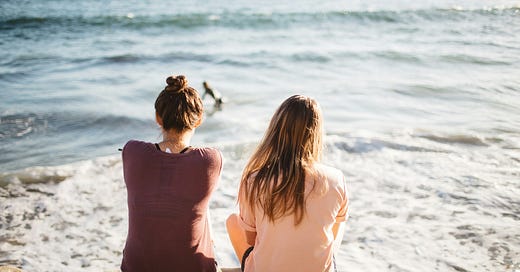I had this habit in my late teens and early 20’s that got me in trouble with, eventually, almost everyone. I wanted to Do.All.The.Things. To be more specific, I wanted to see all the people. I’d make plans to get bagels with Tracy at 12, spend an hour with Sarah at her house at 2, and meet Jaime for a walk at 4. (Not their real names; changing identities to protect the innocent!) What could I say? I loved people and being with my friends. Yay, friendship! I wanted to see everyone. I could do it all.
So known was I for this tendency that my sister affectionately raised the point in the maid-of-honor toast she gave at my wedding, when I was 23. And I distinctly remember a conversation with my groom – way before he was the groom, more in early-boyfriend stage – when he said he felt a bit pushed out by my social commitments.
It turned out that people weren’t crazy about being shoe-horned into my overfull schedule, “checked in with” like they were a medical appointment. If I was only going to come for an hour before rushing off to see someone else, then hey – just skip it. And who could blame them? My effort to prioritize everyone had the unintended consequence of making no one feel prioritized. It wasn’t doing me any favors either – the rushing and stressing. A kind of relational FOMO fueled me.
Maybe you can relate to this. Or maybe your situation’s a little different – maybe you try to pack too many activities into one day, do five things when there’s only time for three. (I have this one too, so I feel you.) Or maybe this hits you only on vacation – you simply must fit in the Eiffel Tower and Notre Dame and the Louvre and the Arc de Triomphe on the your one-day layover in Paris.
The issue is the same throughout: we want all the things. Often we want them for good reasons – in my case it was for friendship, a great reason to act. But whether our reasons are good or not, the fact remains: we can’t have all the things.
This point seems ridiculously obvious. Is it even worth making? Yes. We’re missing the essence of it, to our harm. So let’s unpack.
We can’t do all the things because we’re finite, limited people with constraints of time and space. No way a person can do all the of worthwhile things (or visit with all the wonderful people) there are in the world. A day holds 24 hours, a life 80 years – on average. We dwell in just one geographic spot.
The difficulty is that we don’t believe that limits apply – that they’re realities, not just suggestions. This has always been the case – think of the ancient myth of Icarus flying too close to the sun. But we struggle more with limits now because modern life and technology encourage us to believe we’re limitless. We can multi-task! We broadcast to millions over the internet! We’ll be at your house in 20 minutes… and we can be in Toyko tomorrow at dawn! We have “face-to-face” conversations virtually with folks who are timezones away!
But these are just illusions of limit-busting. Boundaries of time and space still apply. We rail against them because we hate them, hate being finite and not in full control, hate the disappointment of not being able to have everything we want.
Good news, though: limits are the doorway to freedom. When we accept that we can do just one thing at a time and be in just one place at a time – when we accept that we must choose – we discover the possibility of peace. We’re able, profoundly, to be present.
Natural law is the set of millenia-old universal truths (Plato being the first articulator), derived from nature and common to all humans, that’s discovered through reason. It shows us how to act for what’s good. It’s a near-lost gem that needs to be revived. And natural law teaches us this:
There’s no ideal state on this earth. There is no way to achieve all the goods in one day or one lifetime – mine, yours, or anyone else’s. There’s not even necessarily a way to know if the choice you just made brought about the optimal amount of good.
What there is, though, is this: the opportunity to identify a basic good and to simply pursue it. Choose beauty – watch a sunset, listen to a piano concerto. Choose knowledge – read a book. Choose health – go for a walk. Choose play – knit a sweater or perfect your goal kick. Or choose friendship – wisely. Not how I did it in my younger years, in a consumeristic and efficiency-driven way, but simply to delight in your friend and be delighted in.
The best way to be human is to accept the limits we have, to choose goods – one by one – with eyes wide open, and to embrace the flourishing they bring. Here’s to it.





So true. Poor Icarus.
But the other illusion is that we have unlimited choices - or at times any choice at all. And yet the choices we can make have consequences - another limitation! Life is finite. (Hey kids, money is finite too). We may not all reach our potential but I know we will all die. Freedom isn't what we think it is.